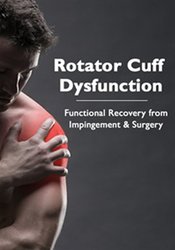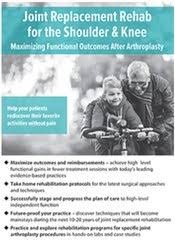🌟 New Year Offer 🌟
Celebrate 2026 with 30% OFF on all products! Use code: NEWYEAR2026. Hurry, offer ends soon!
Further complicating the issue is reimbursement and providers that only allot a limited number of visits to complete rehabilitation. Clinicians must be knowledgeable about not only “tried and true” techniques
Terry Trundle – Rotator Cuff Dysfunction – Functional Recovery from Impingement & Surgery

Because of the complex design of the rotator cuff, it is susceptible to injury. These injuries can be due to overuse in sports activities or it can occur from repetitive motions. Whatever the cause, weakness, stiffness, and pain often ensue. Secondary impingement is also another difficulty clinicians face when treating the functionality of the shoulder, with this condition being one of the most often misunderstood and difficult to assess. Because the shoulder plays a sizable role in arm functioning, proper rehabilitation of this joint is essential to return the patient to a healthy state.
Further complicating the issue is reimbursement and providers that only allot a limited number of visits to complete rehabilitation. Clinicians must be knowledgeable about not only “tried and true” techniques, but must also stay abreast of current research, new products available, and developments within their field. Clinicians who fail to do this can be increasing their patient’s recuperation time and missing important treatment goals.
Get immediately download Terry Trundle – Rotator Cuff Dysfunction – Functional Recovery from Impingement & Surgery
This recording will demonstrate how to be more innovative in your treatment planning, examine functional approaches to rehabilitation of the kinetic chains, and illustrate the benefits of incorporating evidenced-based approaches into your “bag of treatment tools.” Examine rotator cuff injuries that occur at different points in the human lifespan, as well as recommended treatment for each population.
Learn why certain injuries are more common with particular age groups, such as instability in teenagers and degenerative joint disease in aging patients. Clinicians will come away excited about trying new, practical techniques that produce results and, in turn, their orthopedic rehab patients will demonstrate a more positive attitude about their recovery.
Course Features
- Lecture 1
- Quiz 0
- Duration 10 weeks
- Skill level All levels
- Language English
- Students 210
- Assessments Yes
- 1 Section
- 1 Lesson
- 10 Weeks
- Purchased: Terry Trundle - Rotator Cuff Dysfunction - Functional Recovery from Impingement & Surgery1

